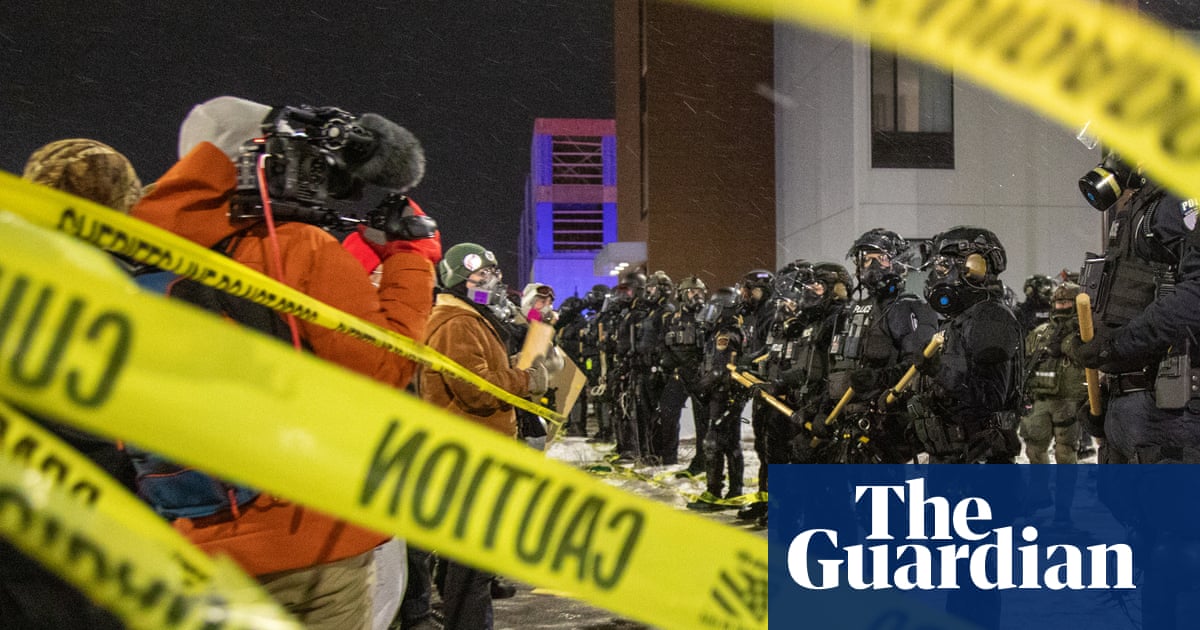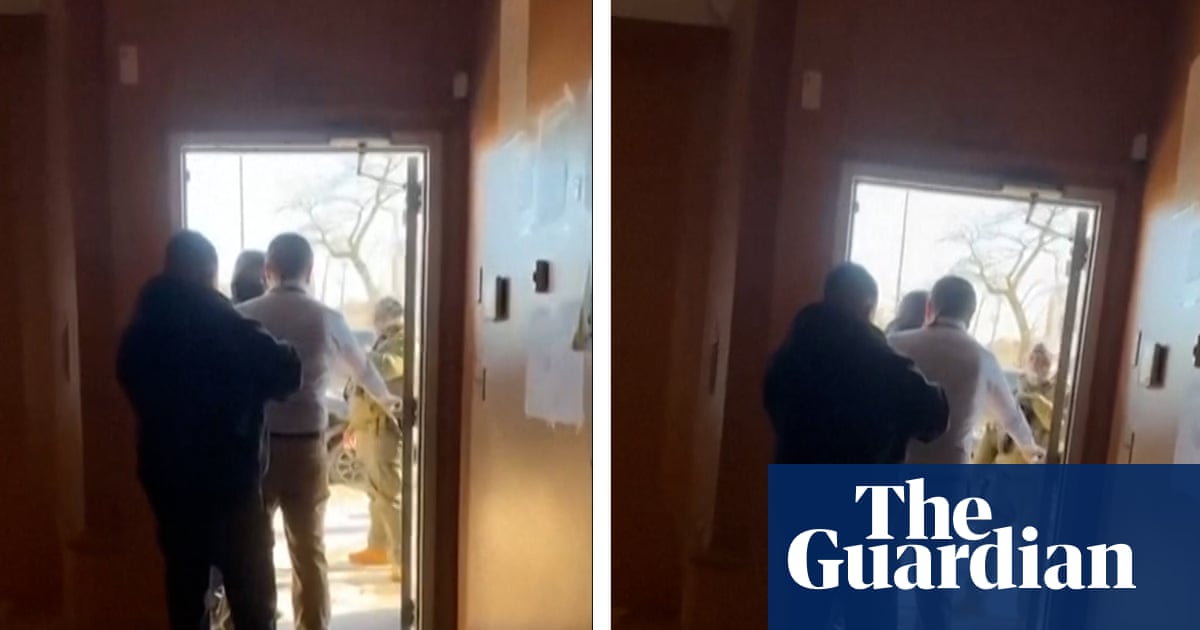Donald Trump’s effort to get his justice department to pay him hundreds of millions of dollars is based on specious legal claims that would likely be rejected if he were any other American, according to a legal expert and a former Department of Justice official who handled damages claims against the government.
Trump has asked the justice department to pay him $230m in damages, the New York Times reported last week. The amount is the total of two separate claims in which Trump argues he is entitled to compensation because of investigations into the links between Russia and his 2016 campaign as well as the 2022 search for classified documents at Mar-a-Lago and subsequent criminal prosecution.
In the Mar-a-Lago complaint, Trump argues he was subject to invasion of privacy, malicious prosecution and abuse of process related to the case.
The effort has set off alarm bells and seen as a staggering act of corruption because the two justice department officials with power to sign off on the claims are Trump appointees and allies. House Democrats sent a letter to the justice department this week calling the effort “blatantly illegal and unconstitutional”.
Trump is seeking compensation under the Federal Tort Claims Act (FTCA), a law that allows people to seek damages from the federal government. The law requires claimants to first file an administrative claim for damages; the government then has six months to either settle the claim or deny it. After six months, or if the claim is denied, the claimant can file a lawsuit. The government has not responded to either of Trump’s claims, but Trump has not filed a lawsuit. It is extremely difficult for a claimant to successfully recover damages under the law.
The New York Times published the form Trump used to make the claim about the Mar-a-Lago raid – the only claim that has become public so far. Trump requested the government pay him $100m in compensation. Additionally, a memo attached to the claim requested $100m in punitive damages and says the president suffered $15m in actual harm due to legal costs connected to the case. It is not clear why the claim cover sheet seeks $100m in damages while the memo outlines $115m in requested damages.
Trump’s legal costs in the case were covered by his Super Pac, Save America. Trump retained six lawyers for himself in the classified documents case, including Todd Blanche, who is now the deputy attorney general.
Trump told reporters last week he would donate any money from a possible settlement to charity. The president has a history of making charitable promises that never materialize.
The amount Trump is demanding far exceeds the amount typically paid out by the justice department in administrative settlements under the FTCA. A Guardian review of FTCA claims filed against the federal government that were administratively settled from 2020 to 2024 shows the average settlement amount to be about $51,684. The largest administrative settlement during that time period was for $3.55m. The 139 administrative settlements the justice department reached last year with victims of Larry Nassar, the doctor who abused Olympic gymnasts and many others, totalled $138.7m.
Those seeking a settlement usually aim high because their initial request sets a ceiling on what they can recover, said Gregory Sisk, a law professor at the University of St Thomas in Minnesota. Still, he said, the amount Trump is requesting was difficult to take seriously.
“Typically, someone who was asking for this amount of money, it would be very quickly rejected, because it would be thought of as absurd to request that amount,” he said. “I cannot think of any prior claim, at least at this early stage, that has been settled that involves money approaching that level.”
Cases including a request for more than $4m typically have involved children who had been injured and had a lifetime of medical expenses and lost earnings capacity, according to Rupa Bhattacharyya, a former justice department attorney who worked on FTCA claims, adding that it was also extremely rare for the government to agree to such a big settlement without litigating it.
“A lot of the cases that get settled are small potatoes. If someone slips and falls in the Smithsonian and breaks their arm, they might settle that claim because it’s just not worth it to litigate it,” she said. “But big-money cases, it’s pretty rare for claims to be settled at the administrative stage because before the government pays out taxpayer funds, it wants to ensure that it in fact has a reason to do so.”
Normally, it would be easy for justice department lawyers to reject the overwhelming majority of the money Trump is requesting. The FTCA does not allow for punitive damages.
“It is a frivolous claim to ask for punitive damages under the FTCA. The statute is explicit,” said Sisk.
A key provision of the FTCA immunizes government officials when they are exercising their discretion within the bounds of a policy set by the government. The search warrants of Mar-a-Lago were approved by a magistrate judge.
“Since it was pursued pursuant to a warrant that had been issued by a judge who found that there was probable cause, that would be a pretty high hill to climb for the typical individual who claimed that they had been subjected to trespass by a search, even if the government ultimately concluded we’re not going to bring charges. Or charges were brought and you were acquitted,” Sisk said.
He added he would be surprised if there were many previous cases where anyone who was the subject of a search conducted after obtaining proper probable cause was able to obtain a settlement from the government.
Experts also questioned whether Trump would be able to recover attorneys’ fees in the case. The FTCA caps what an attorney gets paid as a portion of the plaintiff’s recovery, Bhattacharyya said.
after newsletter promotion
Outside of the FTCA, when litigants try to get adversaries to pay their cases in court, judges typically investigate whether the amount billed was reasonable.
None of that may matter. The deputy attorney general and the associate attorney general both have the authority to require FTCA claims above $4m. Both positions are currently held by men who are Trump allies. Blanche, the deputy attorney general, defended Trump in the criminal cases against him. Save America also paid legal fees for Stanley Woodward, the associate attorney general who leads the department’s civil division, and who defended Trump’s valet, Walt Nauta, in the classified documents case. Both men have final authority on sign-offs for the settlements.
This has raised alarm and created serious legal ethics problems, said Joseph Tirrell, who was the top ethics official at the justice department until he was fired earlier this year. (He is suing the department for wrongful termination.)
“There’s just nobody that can make this decision, career or political appointee, who’s not going to be chock-full of ethical conundrums here,” he said. “In this case, there’s nobody to kick it up to. The attorney general has just as significant conflicts, if not more so than Mr Woodward and Mr Blanche. And frankly, the risk of any or all of them being fired if they don’t make a decision that comports with the president’s wishes is just as significant and applies to every employee in the department of justice, if not every employee in the executive branch.”
“In any circumstance, all officials at the Department of Justice follow the guidance of career ethics officials,” said Chad Gilmartin, a justice department spokesperson. That was of little reassurance to Tirrell.
“Can you imagine an ethics official, a career official, making this decision without thinking: ‘Well, if I don’t tell them what they want to hear, I’m going to lose my job’?” he said.
There also may be little information provided to the public once a settlement is reached. Details of administrative settlements are not typically disclosed to the public, though some basic details are included in a year-end report to Congress.
In an essay published this week, Bhattacharyya outlined a solution for the justice department to handle Trump’s claim: do nothing.
The FTCA does not require the department to respond to Trump’s request for a settlement, and the president can pursue it in court, where he would have to more fully flesh out his arguments before a judge and offer evidence in the public eye.
“If President Trump wants to press his legal claims in a court of law, let him try, as thousands of tort claimants do every year,” she wrote.
“Settling President Trump’s administrative claims before there has been any opportunity to test or defend those claims should be a non-starter for the justice department if it is to retain any integrity, a commitment to doing justice, and a sense of responsibility for the US taxpayer dollars with which they have been entrusted.”
Will Craft and Hugo Lowell contributed reporting

 2 months ago
49
2 months ago
49

















































